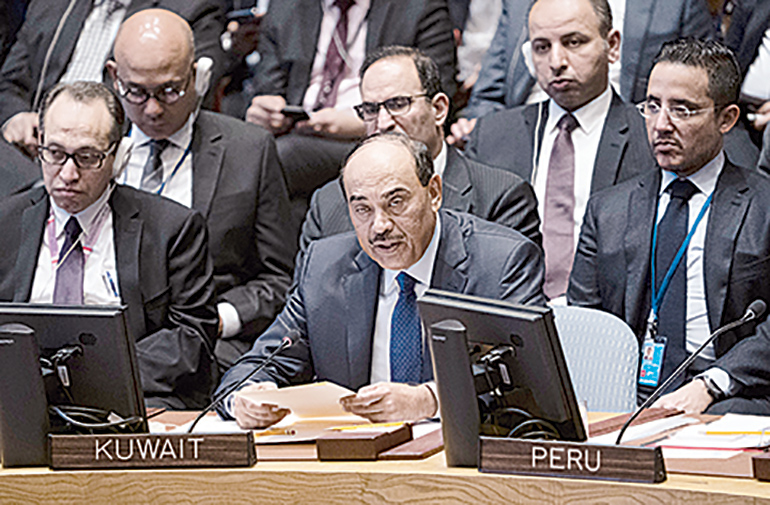

NEW YORK: Kuwaitsaid Friday that the world shares common but variable obligations to addressclimate change, which required a political will and an international solidarityto tackle impacts of this change. Deputy Prime Minister and Foreign MinisterSheikh Sabah Al-Khaled Al-Hamad Al-Sabah called for protecting earth fromfurther deterioration of climate change. Speaking in a UN Security Council'ssession on addressing impacts of climate-related disasters on internationalpeace and security, Sheikh Sabah Al-Khaled said studies showed deteriorationwas faster than 'our steps to protect and preserve environment.' "We cansee negative impacts of climate change by our own eyes, from which millions ofpeople suffer ... like lack of food security, scarcity of water and other riskson health of humans and other living creatures," he said.
Floods,hurricanes, desertification, rising temperature, and rising levels of seas andoceans were threatening Island Countries in the Pacific, Sheikh Sabah Al-Khaledsaid. He added that international efforts contributed to the 2015 agreement inParis on climate change, but the world needed to do more in order to maintainthis accord in order to keep temperature of earth before two or 1.5 degreesCelsius by 2020.
Sheikh SabahAl-Khaled, who voiced concern over World Meteorological Organization's reportsthat years 2015-17 witnessed unprecedented high temperatures, expressed hopeworld climate summit, due next September, would follow up outcome of UNFramework Convention on Climate Change's (UNFCCC) meeting held in Poland latelast year. The UNFCCC member countries agreed to boost transparency ininformation sharing over plans regarding reduction of emissions, increasingsupport for developing countries to help them overcome climate change's impactsas well as implementing the Paris agreement, which would enter force in 2020.The natural disasters, stemming from climate change, continued to grow inintensity and accounted for 77 percent of the overall natural disasters in thelast two decades, the minister said, citing UN estimates.
"Theinternational community faces formidable challenges in responding to theemergencies caused by these disasters, which claim more than three millionlives a year in addition to countless wounded and displaced people," hesaid. "Africa, particularly the Lake Chad Basin region and the Sahelregion, took the brunt of the phenomenon of climate change which exacerbated theeconomic and social problems in the continent and fueled armed conflicts andstruggle for the limited natural resources," he explained.
The State ofKuwait shares the global concern over this phenomenon and joins the efforts ofthe international community to curb this problem. "Since the launch of theclimate change talks, we have spared no effort to contribute to mitigating theimpacts of climate change on the local, regional or international scales. Weattached great importance to the negotiating process, which led to the historicParis Agreement. The State of Kuwait prioritized the initiatives to tape intothe resources of renewable energy, including the solar and wind energies, whichare expected to cover 15 percent of the country's needs by 2020," SheikhSabah Al-Khaled revealed.
Similarly, theoil sector has adopted strategies to reduce carbon dioxide gas emissions with aview to attaining green economy and maximizing use of environment-friendlyenergy, he went on. The State of Kuwait works for deeper cooperation andcollective action with other countries of the world on the government andpopular levels to ensure effective and timely response to emergencies and helppeople hit by natural or man-made disasters. In doing so, Kuwait continues toshoulder its international humanitarian responsibility for alleviating theimpacts of climate changes on social peace, food security, biodiversity,sustainable development, he went on.
Sheikh SabahAl-Khaled highlighted the need to leverage modern technologies of environmentprotection and change the human behavior in order to realize the 13thSustainable Development Goal that is 'take urgent action to combat climatechange and its impacts.' Concluding, the minister renewed Kuwait's resolve toprioritize contributing to the international collective efforts in this regard,through backing the UN agencies concerned with conflict prevention, crisismanagement, peace building, climate change curbing, and realizing the SDGs.
Women's role
Meanwhile, SheikhSabah Al-Khaled said that support for the role of women in the Middle East andNorth Africa (MENA) region requires international collaboration. Speaking at aUN Security Council session on the potential of national action plans foradvancing Women, Peace and Security (WPS) agenda in the MENA region in New Yorklate Thursday, Sheikh Sabah Al-Khaled said that the session is vital andunderlines UNSC's - in addition to GCC, Arab League and IOC - keenness andawareness of women's 'pivotal' role, especially in relation to resolution 1325.
The resolutionacknowledges the disproportionate and unique impact of armed conflict on womenand girls. It calls for the adoption of a gender perspective to consider thespecial needs of women and girls during conflict, repatriation andresettlement, rehabilitation, reintegration, and post-conflict reconstruction.Shedding light on the matter, Sheikh Sabah Al-Khaled branded as 'genuine' womenpartnership in achieving stability, safety and advancement on political,economic and social scales. In this vein, he pointed to Kuwait's commitment tofulfill international requirements to provide women with the equal and decentliving standards enjoyed by men.
The meeting wasconvened by members of the Security Council: Germany, Peru, and the UnitedKingdom, and presided over by Heiko Mass, Federal Minister for Foreign Affairsof Germany. Kuwait has a non-permanent seat in the council and continues itsmembership throughout 2019. Voicing support to efforts aiming at preventingconflicts, the Kuwaiti top diplomat also welcomed endeavors to involve women inresolving crises in the MENA region, especially the ones in Syria and Yemen.The meeting also featured panelists from Iraq and Lebanon, who providedinsights on common barriers to implementing the WPS agenda in the Middle East,and their efforts to overcome these challenges.
Sheikh SabahAl-Khaled's delegation to the meetings consisted of Assistant Minister for theAffairs of the Foreign Minister's office Ambassador Sheikh Dr Ahmad NasserAl-Mohammad Al-Sabah, Kuwait's Permanent Representative at the UN headquartersin New York Ambassador Mansour Al-Otaibi and a number of senior officials atthe Foreign Ministry. - KUNA

